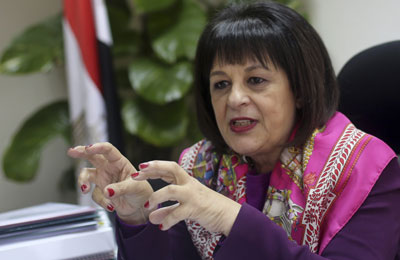
Coal 'no solution to Egypt's energy woes'
Cairo, March 17, 2014
By Maggie Fick
Egypt's worsening energy problems and the demands of heavy industry are no reason to embrace coal, the environment minister says, warning of long-term damage to the economy and to public health.
Industry and Investment Minister Mounir Fakhry Abdel Nour said last week that companies could use coal as early as September provided they abide by strict environmental regulations.
But Environmental Affairs Minister Laila Iskander said energy woes and the demands of heavy industry could not justify the burning of coal, a notoriously pollutive fuel that she said would not be subject to adequate oversight given Egypt's lax regulations.
"We don't have the systems, the laws, the infrastructure or the general climate of compliance," she said in an interview with Reuters as a debate over the possible use of coal raged in government circles. "Maybe in another life."
Egypt is already one of the most polluted countries in the world. Cairo ranks as among the most polluted cities, along with Beijing and other congested capitals like Lima.
Even though Nour appeared to be speaking prematurely, some foreign cement companies are proceeding as though they have a green light to use the fuel as an alternative to gas and diesel, which are in short supply in Egypt.
Two factories have already begun changing their infrastructure to accommodate coal use, violating a law requiring companies to first submit to an an environmental impact assessment, Iskandar said.
She scoffed at what she sees as the token caveat - the promise to adhere to environmental standards - from fellow minister Nour and industry executives.
"We have big concerns about the additional burden" of trying to get energy-intensive industry to comply with environmental standards, she said.
Local anti-coal campaigners like Ahmed Al-Droubi, a coordinator of the Egyptians Against Coal movement, agree. He points to the government's inability to even enforce traffic laws effectively as an example of the lack of willpower.
Even if regulation was possible, he condemned coal as the "most polluting fuel in the world".
Appearing on talk shows since the issue was thrust into the spotlight after Nour's comments, industry advocates have presented coal as the do-or-die solution for factories, the easiest way to diversify the energy sector quickly.
But pointing to risks ranging from potential coal spills into the Red Sea, a popular tourist destination, to emissions that will worsen already oppressive pollution, Iskander said coal threatens to destroy tourism - a pillar of the economy.
"People visit Egypt for 'destination tourism.' They fly from their country to Gouna, to Sharm el Sheikh, to South Sinai," she said, ticking off Red Sea resort locales that would be at risk if cement firms were to begin receiving imports at the nearby port of Safaga.
The minister says alternative energy solutions such as refuse-derived fuel and agriculture waste would be sustainable, job-creating, alternatives to coal.
She argues that importing coal will hurt national security by creating new dependency on another energy source that must be imported.
In spite of her arguments, the minister appears to be fighting an uphill battle. The environment is low on the government's priority list, and does not seem to be forefront in the mind of many Egyptians.
A "No Smoking" sign in the lobby of her ministry went unheeded during a recent visit. Cigarette smoke had partly obscured it.
Choking on exhaust fumes while stuck in Cairo's infamous traffic or watching orange smoke spew from a fertilizer factory in the Nile Delta are common experiences in Egypt.
TAKING ADVANTAGE
Egypt's rapidly growing population and increasing dependence on natural gas due to artificially low subsidised prices have led to demand outstripping supply in recent years.
The situation is becoming more acute because of political tensions between Qatar and Egypt since the overthrow of President Mohamed Mursi last year.
Diesel is a costly alternative to gas that can be used by heavy industry and for power generation but it is more expensive.
Environmental activists say international firms operating cement factories in Egypt are taking advantage of the interim government's panic over the short-term energy crisis, along with a lack of awareness among citizens, to push for coal, a fuel being phased out in most developed countries.
Although the cement industry was once wholly state-owned, a privatisation effort under President Hosni Mubarak, toppled in a 2011 uprising, saw an end to public ownership at all but two factories, according to activists.
But the private factories are still supplied by the government with artificially cheap fuel, thanks to a decades-old subsidies programme that drains Egypt's hard currency reserves and accounts for at least a fifth of government spending.
Iskander said the practice of giving deeply discounted fuel to firms at the state's expense "absolutely" needs to be revisited: "It's a remnant from the Mubarak days."
Iskander said that there is only one short-term measure that could ease pressure of inevitable shortages this summer: "every citizen turning off one light bulb."
The coal issue raises questions about development strategies in Egypt, where a quarter of citizens live below the poverty line of $1.65 a day, she said.
"Nobody is taking to the streets over the environment, yet," she said. "They have done so over bread and corruption."-Reuters







